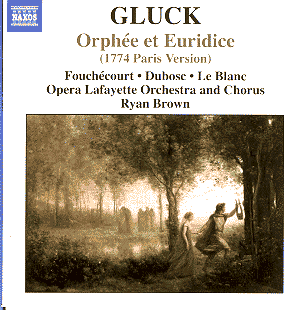Posterity tends to favour a composer’s final thoughts
when it comes to choosing the version of an opera to enter the
standard repertoire. But Gluck’s setting of the Orpheus legend
is an opera that bucks the trend. The opera was originally written,
to an Italian libretto, for an alto castrato; Gluck also went
on to produce an Italian version for a soprano castrato. When
he moved to Paris, the Italian Orfeo ed Euridice was
one of the works that he quarried to produce a group of French
operas in which he brilliantly synthesized the ‘new simplicity’
of his Italian reform operas with the traditions of the French
lyric theatre. Unfortunately for posterity, one of the French
traditions that Gluck embraced was the use of the haut-contre
rather than castrati.
The haut-contre voice is a species of high tenor
in which the upper tenor register is extended using falsetto.
This voice-type fell out of use in the 19th century
and when Berlioz came to produce his version of Gluck’s Orphée
et Eurydice he kept the musical innovations and structure
of the French haut-contre version, but transposed the
hero back to an alto voice, suitable for a 19th French
operatic (female) mezzo-soprano. And it is this version (back-translated
into Italian and known as the Ricordi edition) which has come
to be taken as standard.
Compared to the number of recorded versions of the Riccordi
edition and the original Italian version, Gluck’s own final
French version of the opera has fared rather badly on record.
This is for two reasons. Firstly, it is only with the work of
conductors like William Christie that we are re-discovering
the real haut-contre voice; secondly, the rise in pitch
on modern instruments puts the part beyond the reach of most
tenors.
Given these problems, it is ironic that the most perfect
recording of the haut-contre version of the opera was
one made in the 1950s by Leopold Simoneau. He does use some
transpositions and stylistically the accompaniment is rather
old-fashioned, but Simoneau is almost unique on record in that
he manages to combine a feel for the neo-classical simplicity
of Gluck’s melodic lines with the intense passion of the subject
matter. It helps, of course, that Simoneau was a native French
speaker.
Mark Minkowski has recorded the work on Archiv with Richard
Croft in the title role and now Naxos has released a recording
of Orphée et Eurydice made following stage performances
by the Washington DC based group, Opera Lafayette directed by
Ryan Brown.
The big advantage that Brown’s recording has is the presence
of the distinguished French haut-contre, Jean-Paul Fouchécourt.
Anyone familiar with the opera sung by a female singer might
get a bit of a shock when listening to Fouchécourt. Berlioz
arranged the opera so that the vocal part sits squarely in the
centre of the voice. But the haut-contre voice tends
to shade away in its upper registers, the whole shape and contour
of the part is altered as Fouchécourt very lightly touches in
the upper notes. And in the bravura aria which concludes Act
I, Fouchécourt sings the passagework in a light, sketchy way
which is light-years away from the traditional mezzo-soprano
interpretation.
Fouchécourt is a stylish singer and his way with the
part is attractive but his reading of the role lacks, for me,
passionate intensity; a reflection perhaps that singing Gluck’s
new simplicity is rather different from singing operas by Lully
and Rameau.
Ryan Brown’s view of the work also seems to pay little
attention to the lyric, neo-classical elements of Gluck’s score.
From the opening moments of overture, Brown and the Opera Lafayette
Orchestra give a performance notable for its highly accented
vividness and for its lack of a sense of line and classical
simplicity. The Orchestra contribute some wonderfully exciting
moments, but failed to provide the long breathed control of
Gluck’s paragraphs. In a sense, the performance is taken from
the point of view of Gluck’s predecessors, after all the opera
was premiered just 10 years after Rameau’s death; as such it
is given from a perfectly valid point of view. Its just that
I would prefer a performance which reflected more of Gluck’s
influence on later classical musicians.
Fouchécourt is well supported by the Euridice of Catherine
Dubosc and Amour of Suzie Le Blanc; Le Blanc is notably successful
at suggesting the tones of a boy soprano.
There were occasional moments where the ensemble and
tuning of the orchestra is less than ideal. But there again
this is a live recording, with all the advantages of freshness
and vitality that this implies.
At 85 minutes this is slightly poor value for 2 CDs;
but at super-budget price this set is highly recommendable.
Perhaps we still need an ideal performance of this version of
the opera, but Fouchécourt and Brown provide a convincing argument
for considering the primacy of this version of the opera.
Robert Hugill
see also Reviews
by Göran
Forsling and Christopher
Howell

![]() Orphée – Jean-Paul Fouchécourt (haut-contre)
Orphée – Jean-Paul Fouchécourt (haut-contre)![]() NAXOS
8.660185-86 [41.03
+ 44.40]
NAXOS
8.660185-86 [41.03
+ 44.40]










